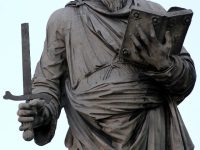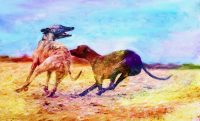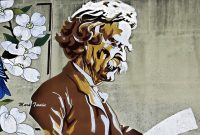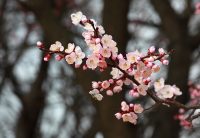子供たちを愛している…

子供たちを愛しているなら、祖国を愛しているのなら、私たちを愛してくれる神を愛しているのならば、奴隷という束縛からあなたたちの手を解き放ちなさい。子供たちや祖国に、その重荷を負わせてはなりません。 – リチャード・アレン (1760 – 1831) More »


子供たちを愛しているなら、祖国を愛しているのなら、私たちを愛してくれる神を愛しているのならば、奴隷という束縛からあなたたちの手を解き放ちなさい。子供たちや祖国に、その重荷を負わせてはなりません。 – リチャード・アレン (1760 – 1831) More »

Words hurt more than swords. More »

言葉は剣以上に人を傷つける。 More »

It’s dog-eat-dog. [Dog-eat-dog.] / (⇔)Dog does not eat dog. More »

骨肉相食む(こつにくあいはむ)。(日本の諺) / (血を分けた者同士が互いに争う。) / 共食いをする。[仲間同士で争う。] / (⇔)仲間同士で争わない。 More »

“A classic”: something that everybody wants to have read and nobody wants to read. – Mark Twain (1835 – 1910): Speech, quoting Professor Caleb Winchester, 20 Nov 1900, Nineteenth Century Club, NYC More »

「古典」: 誰もが読んでしまいたいと思っているが、誰も読みたいとは思わないもの。 – マーク・トウェイン (1835 – 1910): 1900年11月20日ニューヨーク市でのスピーチ(ケーレブ・ウィンチェスター教授の言葉より) More »

Plum flowers! Don’t forget the springtime, even though your master is no longer with you. When an easterly wind blows, be sure to send me–your sweet fragrance. – Sugawara-no Michizane (845 – 903) More »

東風吹かば にほひおこせよ 梅の花 主なしとて 春を忘るな(こちふかば においおこせよ うめのはな あるじなしとて はるをわするな) – 菅原道真(すがわらのみちざね) (845 – 903) More »
![IMAGE: Beggars mounted run their horse to death. [Set a beggar on horseback and he'll ride to the devil.]](https://www.ok312.net/wp-content/uploads/2018/04/mummification-60510_640trim480-200x150.jpg)
Beggars mounted run their horse to death. [Set a beggar on horseback and he’ll ride to the devil.] – York — William Shakespeare (1564 – 1616): Henry VI. Part III, Act I, Scene IV More »